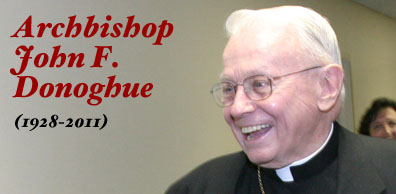
 ATLANTA—Archbishop-emeritus John Francis Donoghue of the Archdiocese of Atlanta died Nov. 11 at the age of 83.
ATLANTA—Archbishop-emeritus John Francis Donoghue of the Archdiocese of Atlanta died Nov. 11 at the age of 83.
He was the fifth archbishop of the province serving from Aug. 19, 1993, until Dec. 9, 2004, when Pope John Paul II accepted his retirement.
His body will lie in state at the Basilica of the Sacred Heart of Jesus, 353 Peachtree St. NE, Atlanta. Viewing times are: 10 a.m. to 9 p.m. Nov. 16, and 8:30 a.m. to 10 a.m. on Nov. 17. On Nov. 17, there will be a procession of the body to the Cathedral of Christ the King, 2699 Peachtree Road NE, and the funeral Mass will begin at 11 a.m.
Archbishop Donoghue made the center of his pastoral work a renewed understanding of and devotion to the Eucharist as the real presence of Christ, a central dogma of the Catholic faith. He initiated a Eucharistic Renewal, and many new adoration chapels including one at the Cathedral of Christ the King in June 1994. Over 70 parishes of the archdiocese have prayer before the Eucharist regularly, eight with perpetual adoration.
Archbishop Donoghue expressed the hope in 1994 that these chapels would bring “a grace hitherto unfelt in the archdiocese” according to a press release from the Archdiocese. As a result, a Eucharistic Congress is held in Atlanta each year that provides multilingual and multicultural faith teaching to gatherings of 20,000 to 30,000 people. It is the longest continually running Eucharistic Congress in the United States and believed to be the largest in attendance.
Archbishop Donoghue also fostered efforts to build new Catholic schools, including two high schools and three elementary schools.
He was devoted to the pro-life cause, frequently speaking on the dignity of human life from conception until natural death and participating in prayer vigils.
The son of Irish immigrants who met and married in Washington, D.C., he said he knew in high school that he wanted to become a priest. He devoted 56 years of his life after his priestly ordination to serving the Catholic Church in Washington, D.C., Charlotte, N.C., and in Atlanta. He was a bishop for 27 of those years.
 Archbishop Donoghue was born Aug. 9, 1928, one of four sons of Daniel and Rose Ryan Donoghue, and raised in northwest Washington. He received a bachelor’s degree in philosophy and a graduate degree in theology from St. Mary’s Seminary in Baltimore and Roland Park, Md. He was ordained a priest of the Washington Archdiocese on June 4, 1955, by then-Archbishop Patrick O’Boyle. While he often said that he expected to serve all his life as a parish priest, he was asked in 1964 to study for a licentiate in canon law and then assigned to the archbishop’s office. For the next 18 years, he served on the staffs of three successive Washington cardinals: Cardinals Patrick O’Boyle, William Baum and James Hickey. From 1972 to 1983, he was the chancellor, vicar general and secretary for support services of the Archdiocese of Washington. In 1984, he was named moderator of the curia for the archdiocese, where he served until appointed by Pope John Paul II as bishop of Charlotte, N.C.
Archbishop Donoghue was born Aug. 9, 1928, one of four sons of Daniel and Rose Ryan Donoghue, and raised in northwest Washington. He received a bachelor’s degree in philosophy and a graduate degree in theology from St. Mary’s Seminary in Baltimore and Roland Park, Md. He was ordained a priest of the Washington Archdiocese on June 4, 1955, by then-Archbishop Patrick O’Boyle. While he often said that he expected to serve all his life as a parish priest, he was asked in 1964 to study for a licentiate in canon law and then assigned to the archbishop’s office. For the next 18 years, he served on the staffs of three successive Washington cardinals: Cardinals Patrick O’Boyle, William Baum and James Hickey. From 1972 to 1983, he was the chancellor, vicar general and secretary for support services of the Archdiocese of Washington. In 1984, he was named moderator of the curia for the archdiocese, where he served until appointed by Pope John Paul II as bishop of Charlotte, N.C.
Archbishop Donoghue was ordained and installed as Charlotte’s second bishop on Dec. 18, 1984. Among the accomplishments in his tenure as bishop were the first synod of the diocese, which held three sessions from 1986 to 1987; the reorganization of the Catholic schools into a regional structure; an emphasis on evangelization directed toward inactive Catholics and the unchurched; and the opening of The Catholic News & Herald newspaper in 1991. He played a leading role in the development of the North Carolina Lutheran-Catholic Covenant signed in 1991 by the Dioceses of Charlotte and Raleigh and the North Carolina Synod of the Evangelical Lutheran Church in America.
In the Atlanta Archdiocese, he succeeded Archbishop James P. Lyke, OFM, who died Dec. 27, 1992, of cancer after only two years in office.
“I hope that I’m going to be here for a very long time … that I will be here until I retire,” Archbishop Donoghue said the day of his Atlanta appointment.
Pope John Paul II spoke to him and told him to “be very kind” to the people of the archdiocese and “to try and bring peace and reconciliation.”
